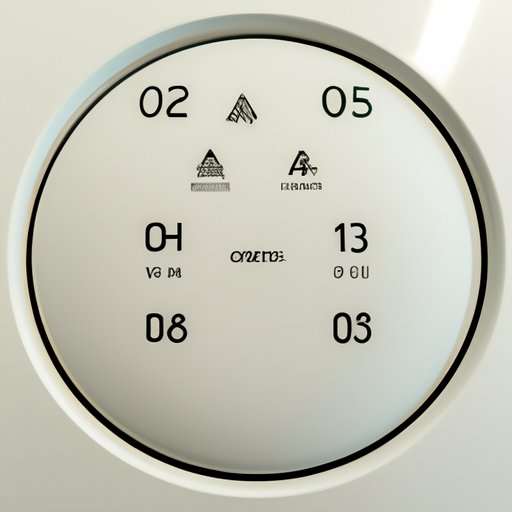Introduction
A washer is a household appliance used to clean clothes, towels, and other fabrics. It uses water to remove dirt, stains, and other debris from the fabric. The amount of water used by a washer can vary depending on the type of washer, the size of the load, the soil level, and the temperature setting. In this article, we will explore how much water does a washer use and discuss the factors that affect its water usage.

Comparison of Different Types of Washers and Their Water Usage
The type of washer you have can have a significant impact on the amount of water it uses. Top-loading washers are the most common and they typically use between 25 and 45 gallons of water per wash cycle. Front-loading washers use less water than top-loaders, usually around 15 to 30 gallons per cycle. High Efficiency (HE) washers use even less water—around 10 to 25 gallons per cycle. These washers are designed to save water by using a combination of decreased water levels, faster spin cycles, and specialized detergents.

Tips to Reduce Water Usage When Washing Clothes
There are several steps you can take to reduce the amount of water used when washing clothes. First, choose the appropriate water level setting for each load. This will help ensure that you don’t use more water than necessary. Second, use cold water for most laundry loads. Hot water not only uses more energy, but can also cause colors to fade. Third, use the proper amount of detergent. Too much detergent can result in wasted water as the excess soap will remain in the washer after the cycle has ended. Finally, consider using a high efficiency (HE) detergent. HE detergents are specially formulated to work best with HE washers, which helps to reduce water usage.

Understanding the Factors that Affect Washer Water Usage
The amount of water used in a washer cycle is affected by several factors. The size of the washer can make a difference, as larger washers tend to use more water. The size of the load can also impact water usage, as smaller loads require less water. The soil level of the load is another factor, as soils with higher levels of dirt and grime require more water for a thorough cleaning. Lastly, the temperature setting can affect water usage as hot water uses more water than cold water.
Guide to Calculating the Average Amount of Water Used in a Typical Washer Cycle
If you want to get an estimate of how much water your washer uses in a typical cycle, here is a guide to help you calculate the average amount of water used. First, determine the size of the washer. Next, estimate the size of the load. Then, determine the soil level of the load. Select the temperature setting that will be used. Finally, use the following formula to calculate the average water usage:
(Size of washer + Size of load + Soil level + Temperature setting) x 0.5 = Average water usage in gallons.
Explaining the Importance of Proper Maintenance to Optimize Water Usage in Washers
Proper maintenance is essential to ensure your washer is using water efficiently. Clean the washer regularly to remove any dirt or debris that could be impacting its performance. Check the hoses and connections to make sure there are no leaks. Inspect the seals and gaskets to ensure they are functioning properly. If you notice any issues, contact a professional to have them repaired.
Conclusion
In conclusion, the amount of water a washer uses can vary depending on the type of washer, the size of the load, the soil level, and the temperature setting. To reduce water usage when washing clothes, choose the appropriate water level setting, use cold water for most laundry loads, use the proper amount of detergent, and consider using a high efficiency (HE) detergent. Finally, proper maintenance is key to ensuring your washer is using water efficiently.


